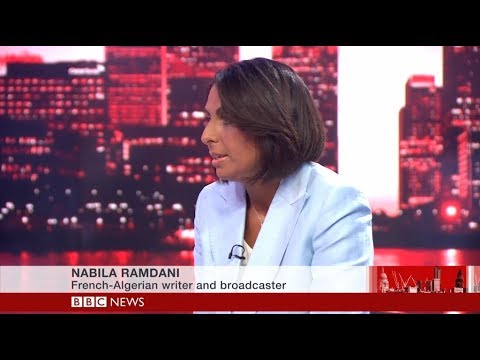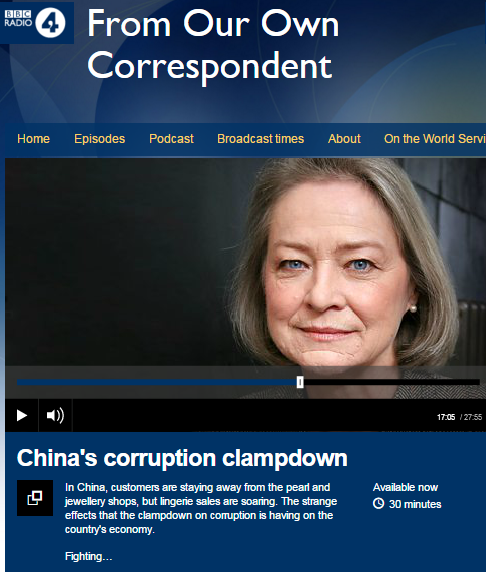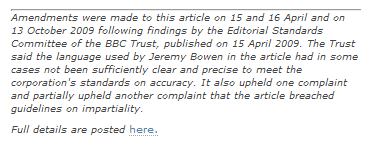Readers may recall that in July 2017 the BBC responded to a complaint concerning an edition of ‘Dateline London’ in which contributor Nabila Ramdani voiced some vicious, off-topic, anti-Israel slurs by saying that:
“We have spoken to the production team and presenter to remind them of the need to ensure that any contentious remarks are challenged and questioned, at whatever point they are made during the programme.”
In January 2018, the BBC responded to yet another complaint concerning falsehoods and anti-Israel smears promoted by Nabila Ramdani on the same programme by claiming that such calumnies are part of a “legitimate debate”.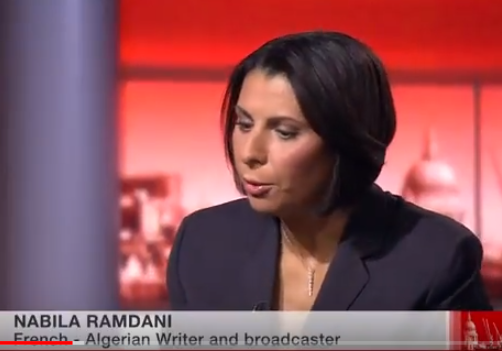
“Our aim is simply to provide enough information for viewers to make up their own minds. This may include hearing opinions or accounts which some people may personally disagree with, but which individuals may be fully entitled to present in the context of a legitimate debate.”
Nabila Ramdani of course was not expressing an “opinion” – she was intentionally making false statements (such as the allegation that Palestinians “are routinely murdered in their thousands” and the claim that the intent of US military aid to Israel is “to ruin their [Palestinians’] lives”) which inevitably influenced viewer opinion because they were not challenged by the programme’s presenter.
BBC Watch hence submitted an additional complaint on that issue and in early April we received a response that included the following:
“Thank you for taking the time to contact us again. We realise you were not satisfied with our earlier response.
We raised your concerns with the Dateline London programme team and senior BBC News staff.
As explained earlier, we allow guests on Dateline London to give their views, as the programme features a range of international correspondents from different publications and backgrounds. As a result the panel on this programme is expected to offer personal opinions, as opposed to impartial reporting from BBC correspondents.
Nabila Ramdani’s viewpoint is one of a number held on the Middle East – we feature a range of opinions over time, even if some viewers will object to a particular outlook. We appreciate it would have been better to highlight such views would be disputed by the White House and Israel, but our presenter aimed to get the discussion back on track rather than prolong the digression. We don’t feel our editorial guidelines have been broken however.
We will continue to use the full range of contributors on Dateline London, to ensure a wide range of views can be heard over time. Having offered this, I’m afraid we cannot correspond with you further at this first stage of the complaints process.”
The edition of ‘Dateline London’ broadcast on May 19th and 20th 2018 included a segment relating to the incidents that had taken place five days earlier on the border between the Gaza Strip and Israel. Three days before this programme was aired Hamas had admitted that fifty of those killed were, according to what Hamas described as “official figures”, members of the terror organisation.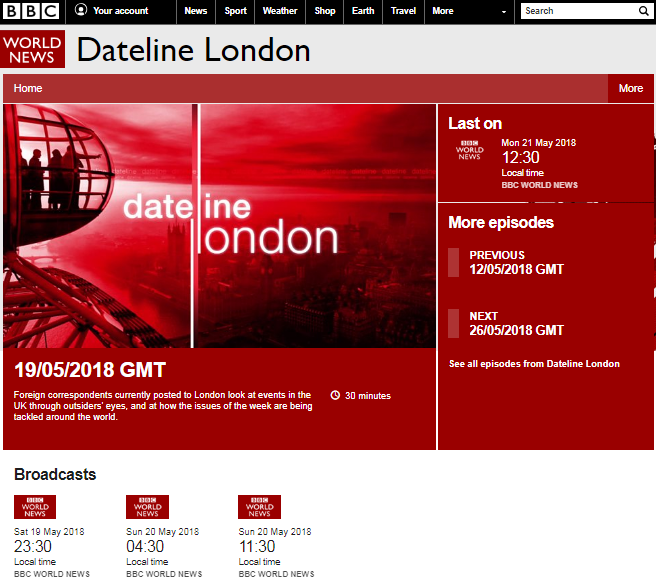
Unsurprisingly, one of the contributors invited by ‘Dateline London’ to discuss that topic and others was Nabila Ramdani. Also on the panel were Stephanie Baker of ‘Bloomberg’, Thomas Kielinger of ‘De Welt’ and Polly Toynbee of the ‘Guardian’.
Presenter Shaun Ley introduced the item (from 09:51 in the video below) with a reference to the 1947 Partition Plan – about which the BBC famously has some long-held – but erroneous – beliefs.
[emphasis in italics in the original, emphasis in bold added]
Ley: “Seventy years ago this week the State of Israel was unilaterally established after a UN Partition Plan which had been accepted by Jewish leaders was rejected by Arab ones. This was the original two-state solution, with the contested city of Jerusalem awarded to neither side. War may have changed the borders of Israel in the ensuing years but the contours of the Palestinian-Israeli conflict have not. The status of Jerusalem is still a flash point, which explains the anger of one side and the joy of the other with Donald Trump’s decision to relocate the US embassy there. Even as Israel’s birthday and that present were being celebrated, weeks of protests in neighbouring Gaza reached their peak. Israel’s defence forces used live ammunition to prevent a breach of the border and the consequent threat to Israeli civilians. On Monday – the actual anniversary of what Palestinians call their catastrophe – nearly 60 of the protesters were killed.”
Although evidence showing that the people described by Ley as “protesters” had carried out several shooting attacks, thrown petrol bombs and attempted to place explosive devices on the border fence had been in the public domain for five days, BBC audiences still heard no mention of that violence. Moreover, the “information for viewers to make up their own minds” that the BBC has claimed this programme provides did not include any mention of the fact that the majority of those killed were affiliated with a proscribed terror organisation.
Ley brought in Ramdani to comment first, failing to inform audiences of the fact that the “protests” were held under the banner of the Palestinian “right of return” – which is aimed at eradicating the Jewish state – and thus meaning that his musings on the ‘peace process’ are obviously at best academic.
Ley: “I mean, Nabila, those scenes were terrible, whatever people’s view of the conflict. Where do we go from here? Is there any sign of a fresh momentum which after all, presumably, some around Donald Trump believe that they might create by ejecting this degree of uncertainty with the embassy decision in Jerusalem?”
10:56 Ramdani: “Well I think first of all it has to be said that there have been some horrendous massacres of Palestinians by Israelis over decades and not least of all over the last few years. I think what this week’s slaughter…you know it was particularly pointed because of what was happening in Jerusalem where one of the most extreme right-wing Israeli governments for years was working with an almost rogue American administration to show its utter contempt for the peace process, international law and indeed for Palestinian lives. Palestinians are viewed with terrifying cynicism by all these extremists. We hear apologists making up fantasy scenarios about Gazans orchestrating a huge invasion of Israel.”
Obviously Ley should at this point have clarified to viewers that prior to the May 14th incidents Hamas’ leader in Gaza, Yahya Sinwar, had on several occasions indeed urged Gazans to breach the border en masse and become ‘martyrs’ – but he refrained from doing so.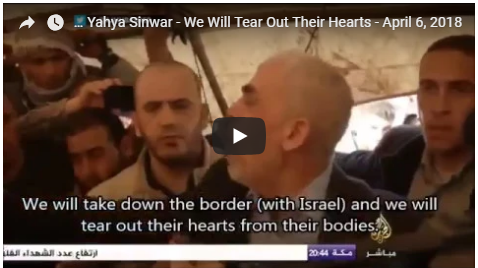
Ley: “But having said that, you’re obviously making the point from your perspective very strongly but the view that is expressed by the Israeli government is that people were a threat to enter the country and that live fire was used on them as a result and only in those circumstances. [unintelligible] that is the subject that the UN inquiry will have to try and establish the facts of.”
12:05 Ramdani: “Yeah, precisely. The facts – not the view.”
Ley: “Your view or their view.”
The BBC Complaints claim that in her contributions to this programme Ramdani is merely expressing “personal opinions” and a “viewpoint” then took a knock from Ramdani herself:
Ramdani: “No, no. I’m dealing with facts. My facts are, you know, it’s anchored in truth. The truth is the Palestinians are in no position whatsoever to invade Israel. Precisely because Gaza…”
Ley: “It’s a call for individuals to cross the border and cause trouble, isn’t it?”
Ramdani: “No. Precisely because Gaza is a prison camp that’s been under siege and under blockade for eleven years, it lacks all the basics including water, electricity and food and medical supplies…”
Ley made no effort to clarify to viewers that there is no lack of food in Gaza and that shortages of electricity and medical supplies have nothing whatsoever to do with Israeli (and Egyptian) counter-terrorism measures but are in fact related to infighting between Hamas and Fatah.
Ley: “So that’s the position as of this week and the last eleven years. What about where we go from here?”
Ramdani: “No but…”
Ley: “That’s the challenge, isn’t it?”
Ramdani: “It has to be emphasised that the majority – overwhelming majority – of those taking part in the protests were unarmed civilians within Gaza itself on their own territory…ah…nowhere near the Israeli fence and yet this idea that a threat could justify indiscriminate execution is diabolical.”
Ley should have pointed out at that point that those ‘Great Return March’ participants who did indeed stay away from the border fence were of course completely safe – but he did not.
Viewers next heard Thomas Kielinger tying the incidents in Gaza to the relocation of the US embassy.
Kielinger: “If you rehouse the embassy…what do you expect? You expect bloodbaths.”
Stephanie Baker later opined:
Baker: “I agree the split images – on the one hand of Ivanka Trump opening the Jerusalem embassy juxtaposed with slaughter in Gaza and wounded Palestinians being carted away – was very disturbing.”
Next up was Polly Toynbee.
Toynbee: “I think once you’ve had a massacre of over sixty people and many, many more severely injured – unarmed protesters…”
Ley: “You don’t buy any suggestion that some of those people were being used by Hamas?”
Toynbee then effectively claimed that rioters planting IED’s on a border fence, carrying out shooting attacks, throwing petrol bombs and setting fire to farmers’ crops with incendiary kites is just like good old England.
Toynbee: “Well you know, protests…protest is often…also includes people who throw stones and get a bit…of course they do. I mean that happens in protests here sometimes. It’s part of protests. But Israel sets it up…sets itself up as the only real democracy in that part of the world. Well what kind of democracy doesn’t allow unarmed protest? What kind…”
Ley: “They’re arguing that they do allow unarmed protest…wat happens in Gaza is different.”
Toynbee: “You allow them but you shoot the protesters. So that’s not allowing them – no.”
Later on Nabila Ramdani let slip a clue indicating that actually she (and presumably others around the table, because no one questioned her) is aware of what viewers of this programme were not told: the fact that not all the ‘protesters’ were peaceful and that most of those killed were linked to terror groups.
Ramdani: “But I have to say, you know, whatever the affiliations or indeed the intentions of some of the people – men and women – who were shot dead by the Israeli military, this idea that terror or criminal suspects can be now – who are within Gaza, on their own territory – can now be murdered in cold blood alongside what Israel I’m sure would call collateral damage is simply monstrous. You know this attempt to whitewash illegal attacks on demonstrators says nothing except to prove what a barbaric regime is currently running Israel.”
Kielinger: “You’re still trying to solve the question of who is to blame and how did this happen.”
Ramdani: “No but I think an obvious way forward, Thomas – with all due respect – is for Israel to stop murdering Palestinians and grant them this basic right to life. […] The right to life is currently being negated.”
Shaun Ley’s nods when Ramdani alleged that Israel is “murdering Palestinians” are particularly noteworthy.
Toynbee: “But Thomas, it’s also that the rest of the world’s democracies to say this is not how democracies behave. Your country, my country – we should all be saying don’t do this.”
Obviously viewers of this programme did not hear “a range of opinions” from its contributors and Shaun Ley’s rather lame efforts to present a different view did not include providing BBC audiences with essential information concerning the violent nature of the event under discussion and the fact that the majority of those described no fewer than three times as “unarmed protesters” were in fact linked to a terrorist organisation.
In those nine minutes viewers did however see two mentions of a “massacre”, two references to “slaughter”, one allegation of “indiscriminate execution” and two references to “murder” – as well as portrayal of Israel’s government as a “barbaric regime” – all of which went completely unchallenged by the BBC presenter and with no right of reply afforded to the country accused of such acts.
So much for the BBC’s claim last year that it had reminded this programme’s production team of “the need to ensure that any contentious remarks are challenged and questioned”.
Related Articles:
BBC responds to complaint about ‘Dateline London’
BBC’s Dateline London facilitates Ramdani’s anti-Israel calumnies yet again
BBC Complaints claims anti-Israel slurs part of ‘legitimate debate’

